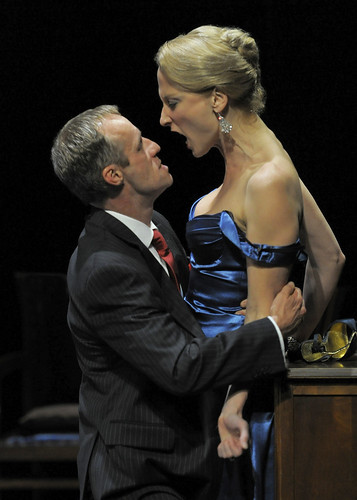
Rod Gnapp and Carrie Paff work out some kinks in their relationship in the Marin Theatre Company production of Edward Albee’s Tiny Alice. Below: Andrew Hurteau as Brother Julian. Photos by Kevin Berne
The legend of Tiny Alice looms large. Edward Albee’s notorious 1964 follow-up to his monster Broadway smash Who’s Afraid of Virginia Woolf baffled critics and continued to cause kerfuffles for years to come (especially when William Ball, in the early days of American Conservatory Theater played fast and loose with the script).
This is not one of Albee’s frequently produced scripts, and after seeing Marin Theatre Company’s riveting production, it’s easy to see why. This play is a monster. It’s not like Albee hasn’t created monsters before (he loves to rile the beasts in many ways), but this one is especially weighty.
Notions of God, faith, corruption and the supernatural all bear down for three acts and three solid hours, which means a serious evening of theater. It’s not that there aren’t laughs – how could there not be, the Catholic Church is involved (cheap shot, sorry)? – Albee is such a sharp writer and this cast is so astute that chuckles and outright laughs are frequent (and that can make the difference between endurance and enjoyment).
But this is a challenging play to say the least. Act 1 is familiar territory as Albee introduces his players, his zest for zingers and a juicy central mystery. In Act 2, the ground begins to wobble, and by Act 3, the ground has given way altogether. The monster, perhaps literally speaking, is loose.
Directing this play has been a decades-long obsession for MTC Artistic Director Jasson Minadakis, and his production clearly demonstrates the guiding hand of someone to whom the play’s mysteries are, if not clear, at least illuminated.
Minadakis has said he couldn’t do the play until he had just the right actors, and it’s good thing he waited as long as he did. The quintet at work on stage here is doing some mighty powerful work.
Andrew Hurteau is the emotionally and spiritually conflicted center of the play as Brother Julian, a lay brother whose crisis of faith – seemingly in his past but powerful enough to institutionalize him for a number of years – makes him especially vulnerable to the machinations of those whose motives may not be pure.
The motives of the Cardinal (Richard Farrell) are quite clear. The Church has been promised $20 billion dollars from the estate of a young woman who, working through her lawyer, wants to spend time with a representative of the Church. That turns out to be Brother Julian. If Alice takes a shine to him, the Cardinal is a hero, and the Church is billions of dollars richer.
From their first, bizarre meeting, Julian and Alice create a bond. It would be hard not to be intrigued by Alice, especially as played by the beguiling Carrie Paff (looking gorgeous in elegant costumes by Fumiko Bielefeldt).
The power dynamic between Paff and Hurteau, sometimes charged with sadistic thrill (Alice) and sometimes with wrenching heartbreak (Julian), never ceases to fascinate.
Alice also works a strange dynamic with her lawyer, played with aggressive intelligence and chilling malice by Rod Gnapp. They have a sexual relationship, but they’re in each other’s heads to a dangerous degree.
Alice’s trusty butler is always on hand to provide a quirky line or a bit of comfort – and Mark Anderson Phillips is a comfort indeed. He makes Butler (yes, that’s the butler’s name) as fascinating as everyone else, even though he functions on the periphery of the action. He, like Julian, seems a little more human than the devils conspiring to win the lay brother’s soul for reasons they won’t divulge until it’s too late (for Julian).
J.B. Wilson’s set (lit beautifully by Kurt Landisman actually becomes another character in the show. As Julian becomes more and more immersed in Alice’s world, he gets to know her mansion and the miniature replica of it that dominates the main drawing room.
I won’t say I understand where Albee is going with Tiny Alice, but I will say I enjoyed the ride. Asking questions about the nature of God and man’s relationship to spirituality is fascinating, especially in the hands of a compelling writer. Brother Julian, so fiercely and compassionately played by the astonishing Hurteau, has a tenuous relationship with God at best. The world of hallucination and reality are not comfortably defined for him, nor are they for us.
FOR MORE INFORMATION
Edward Albee’s Tiny Alice continues through June 26 at Marin Theatre Company, 397 Miller Ave., Mill Valley. Tickets are $32-$53. Call 415-388-5208 or visit www.marintheatre.org for information.


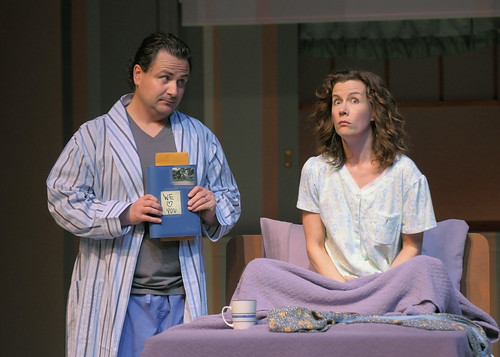
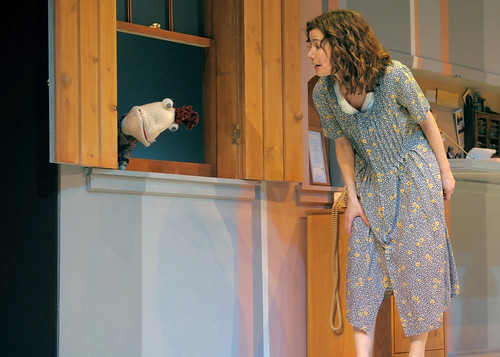
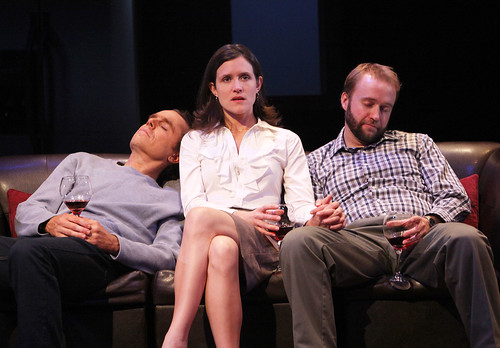
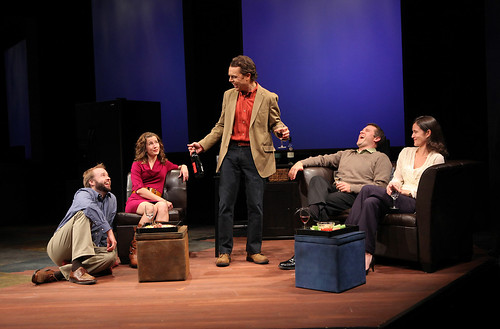
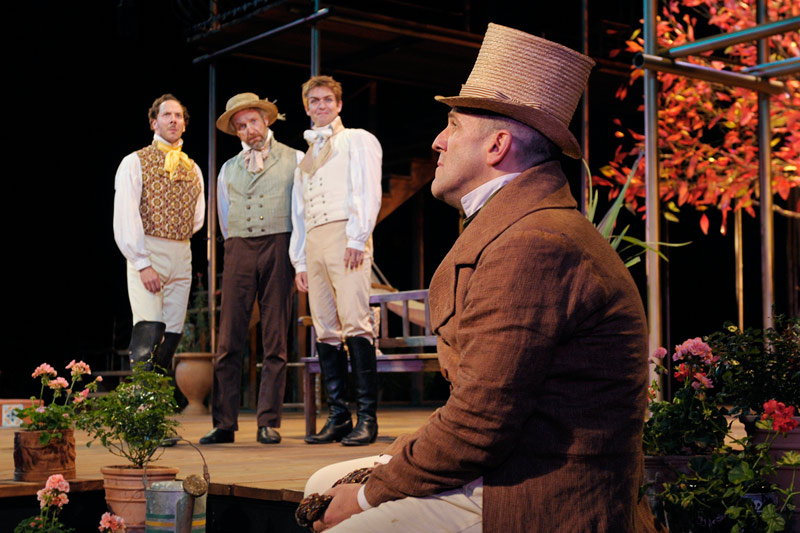

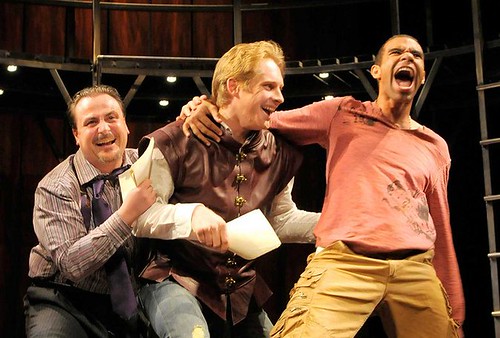
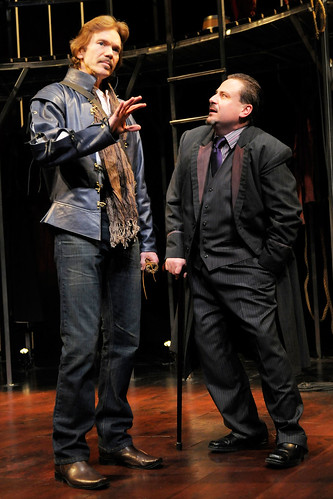
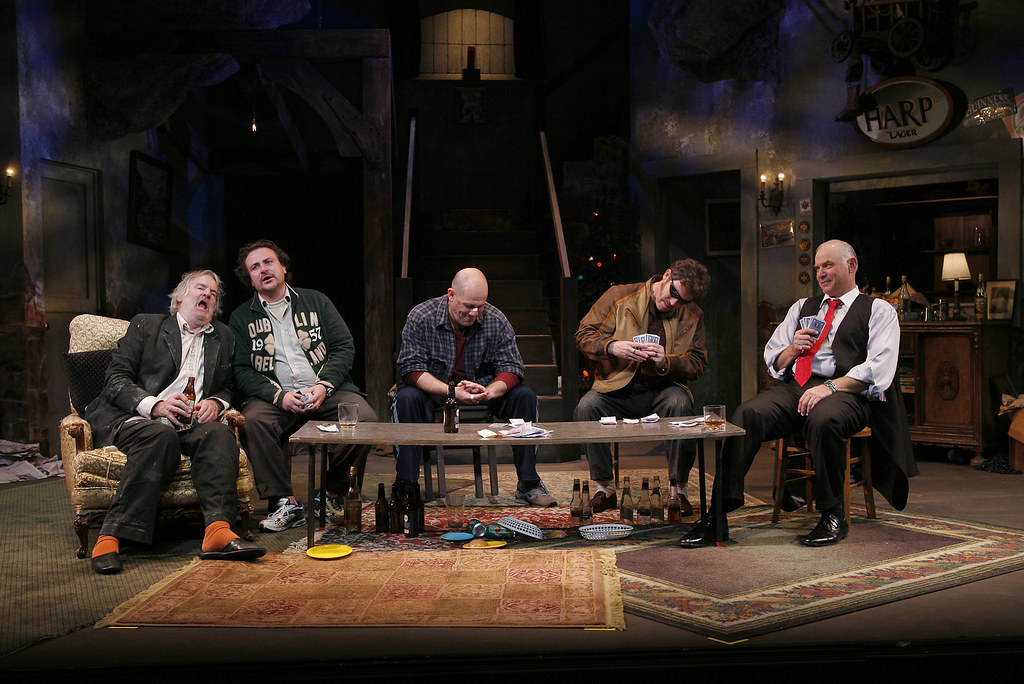
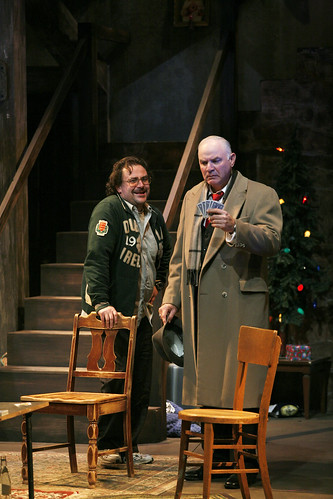 and a friendly poker game, that the devil, in the suave form of Mr. Lockhart (Robert Sicular, right in overcoat with Hurteau), shows up as well to claim a soul that was promised to him about 25 years earlier.
and a friendly poker game, that the devil, in the suave form of Mr. Lockhart (Robert Sicular, right in overcoat with Hurteau), shows up as well to claim a soul that was promised to him about 25 years earlier.